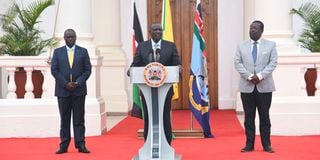Premium
Why Moses Kuria is at the heart of Ruto's grand plan for economic revival

Deputy President Rigathi Gachagua (left), President Dr William Ruto and Prime Cabinet Secretary nominee Musalia Mudavadi at State House in Nairobi on September 27, 2022, during the naming of Cabinet Secretaries.
Proposals to review power tariffs and to have a one-stop shop to address all manufacturers’ concerns, including VAT refunds, and approvals by national and county governments are measures the Ministry of Trade, Investment and Industry is considering to ease doing business.
The ministry is set to play a critical role in President William Ruto’s grand plan to revive the economy as well as implement the bottom-up economic model.
In the run-up to the August 9 elections, Dr Ruto pledged to invest in excess of Sh500 billion in agriculture and the small and medium enterprises in 2023 to 2027.
This places Trade Cabinet Secretary nominee Moses Kuria at the heart of the economic recovery plan that anchored Dr Ruto’s campaign and swept his Kenya Kwanza Alliance to power.
Mr Kuria and the other Cabinet nominees are yet to assume office pending their vetting by the National Assembly.
A document prepared by the ministry has already mapped out some of its short and long term plans, spelling out how it seeks to achieve the promises made by the alliance to support traders and investors.
Part of the plan includes working with the Ministry of Energy to agree on flexible power tariffs to support manufacturers while at the same time encouraging them to utilise night tariffs to grow a 24-hour economy.
Small and medium-sized enterprises
The ministry has also indicated plans to review the current export processing zones and special economic zones incentives regime to create a seamless system that does not discriminate against small and medium-sized enterprises (SMEs).
The proposed incentive regime will be pegged on outputs such as foreign exchange earned and jobs created as opposed to the current system that bases on the size of land.
“Set up a one-stop centre in the ministry for resolving all manufacturers issues, both with the national and county governments e.g approvals, power and water connections, VAT refunds, among others,” states the document.
“Make Kenya Bureau of Standards to play a more facilitative role as opposed to a policing role by hand-holding our manufacturers and assisting them with achieving standards that make our manufactured products more competitive in the local, regional and global markets,” it adds.
The ministry further proposes to devolve industrialisation to the counties through county industrial centres.
It also seeks to work with local and international partners to adequately capitalise the Kenya Development Corporation (Formerly ICDC, Industrial Development Bank and Tourism Finance Corporation) and Kenya Industrial Estates to ensure capital and credit are readily available to all manufacturers, from SMEs to large manufacturers.
Part of the ministry’s plan to promote the Buy Kenya Build Kenya initiative will now include having government institutions, the disciplined forces and educational institutions lead in consuming locally manufactured products.
It also plans to work with the ministries of East African Community and Foreign Affairs to create space for Kenyan manufactured products within the EAC, Comesa and the African Common Market Free Trade Area.
Fiscal space
Other proposed plans are a 12-month rapid response initiative to fast-track all stalled public-private partnership proposals to resolve the issue of limited legroom in the fiscal space.
The ministry has also proposed review of legislation in the privatisation and state-owned enterprises space while revitalising the Nairobi Securities Exchange and raising funds to bridge the budget deficit.
“Establish the office of Investment Ambassadors in key FDI source countries like the GCC, Europe, USA and China in collaboration with the Ministry of Foreign Affairs. Relaunch the Kenya Investment authority one stop centre to make it truly responsive to investor needs,” states the document.
It adds, “Establish Kenya as the destination of choice for global Fintech investors by linking them with our homegrown Fintech talent and taking advantage of the already established place for Kenya as a global leader in mobile money.”
Mr Kuria has had a close working relationship with small and medium enterprises through the Kenya National Chamber of Commerce & Industry, Kenya Association of Manufacturers and the Kenya Private Sector Alliance.





